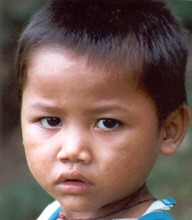Jeng in Laos

Photo Source:
Copyrighted © 2026
Peoples of Laos, Asia Harvest All rights reserved. Used with permission |
Send Joshua Project a map of this people group.
|
| People Name: | Jeng |
| Country: | Laos |
| 10/40 Window: | Yes |
| Population: | 9,600 |
| World Population: | 9,600 |
| Primary Language: | Oy |
| Primary Religion: | Ethnic Religions |
| Christian Adherents: | 5.00 % |
| Evangelicals: | 2.00 % |
| Scripture: | Portions |
| Ministry Resources: | No |
| Jesus Film: | No |
| Audio Recordings: | Yes |
| People Cluster: | Mon-Khmer |
| Affinity Bloc: | Southeast Asian Peoples |
| Progress Level: |
|
Introduction / History
The Jeng are linguistically and historically related to the Oy and Brau people, but they possess certain customs that define their separate ethnicity.
In the past the Jeng lived in the mountains inside Vietnam, but they migrated en masse to the plains of southern Laos in 1936. Today the Jeng people living in six villages in southern Laos. The Jeng (also spelt Chieng) live in one small area in the districts of Samakkhixai and Sanamxai in Attapu Province. The Jeng live along the main roads near the Lao, Oy and Brau. Their houses are dispersed randomly among the rice fields, unlike many other Mon-Khmer groups who place their homes in a circle around a communal house.
What Are Their Lives Like?
Today only a few old women still wear traditional Jeng dress for festivals only; although in recent years there has been a strong desire to preserve Jeng culture, now that much of it has already been lost.
Some aspects of Jeng culture have survived well. Jeng men and women are easily distinguishable for wearing large cylinders in their earlobes. The Jeng own large jars and ancient brass gongs, which were used as currency in the past, probably while they were still in Vietnam. Their culture and worldview have been greatly influenced by the Lao since then, although they have firmly resisted Buddhism.
What Are Their Beliefs?
The Jeng are traditionally animists, although many of their animistic ceremonies have now been abandoned. Their continuing fear of spirits can clearly be seen in their custom of building a miniature model village just for the spirits. Within these villages, which may measure up to 100 meters in length, each particular spirit has its own house. The spirit village is usually built a few hundred meters away from the nearest house in the community. It is the place where people come to make offerings and sacrifices.
The extent that Christianity has affected the Jeng is uncertain. Some may have heard the gospel from the small number of Brau and Oy Christians nearby.
What Are Their Needs?
The Jeng people need to put their trust and identity in the hands of the loving God of Creation who sent his son to make it possible for them to enter the Kingdom of God.
Prayer Points
Pray the Jeng people would be known as temples of the Holy Spirit, and not as communities for housing demons.
Ask God to send evangelists to the unreached Jeng as soon as possible.
Pray the Jeng would be saved, as a testimony of God's grace and a witness to Christ's power over sin.